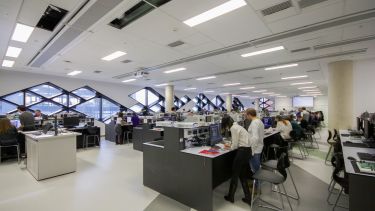Electrical and Electronic Engineering
About this course
- Starts
- September 2025
- UCAS Code
- H629
- Duration
- 4 years
- Entry Requirements
- Standard: AAAAccess: AAB
- Placement Year
- Optional placement year
Course description

Become a specialist in the design of devices and systems that make modern life possible, with a masters degree in electrical and electronic engineering.
Learn to understand electrical and electronic devices that make the human world go round: from machines and power systems like wind turbines, devices such as lasers, microprocessors and computers, to communication systems like 5G mobile networks.
With a masters course, you’ll not only explore the theoretical and practical engineering of these devices – you’ll become an expert.
Practical experience is key to our teaching. As a first year you’ll take part in the faculty's Global Engineering Challenge to solve a real-world problem. In your second year, you’ll work on a week-long project devised by an industry partner called Engineering You’re Hired – and you’ll get the chance to work with an engineering company through the semester-long Sheffield Industrial Project Scheme.
At the end of your second year you can specialise or continue to focus on general electrical and electronic engineering.
Final year modules focus on the application of scientific knowledge to industry. You’ll work in a multidisciplinary team on research, led by an academic but with industry input. This group project will enhance your employability by developing practical transferable skills like team working, decision making, problem solving and communication.
Because we focus on developing your employability, 97.3% of our students go on to graduate-level work or further study within 15 months of graduating (Graduate Outcomes Survey 2020/21).
Why study this course?
- Fully accredited - by the Institution of Engineering and Technology (IET), and meets all the academic standards for Chartered Engineer (CEng) status.
- UK top 5 for electrical and electronic engineering - as rated by The Guardian University Guide, The Times and Sunday Times Good University Guide 2024.
- Specialist teaching facilitiesundefined- 'Learning by doing' is the reason The Diamond was built. Dedicated to engineering, this industrial-scale pilot plant is where you’ll apply the theory you learn in lectures – consolidating your understanding alongside students from other disciplines, and beyond the bounds of the curriculum.
- World-leading researchers - our academics tackle major scientific and technological challenges that have a positive impact on the world, ranging from improving the flow of data via wireless communications, renewable energy production and storage, improved efficiency and accuracy of manufacturing and the electrification of transport. Their research, which has been rated as internationally excellent, is what informs the content of your course.
- Industrial placement year - you have the option to either study abroad for a year or spend a year working in industry, gaining real-world experience and connections. Links with partners such as Siemens Gamesa and Rolls-Royce make Sheffield the right choice if you want to do a placement year – and mean we have world-famous companies joining us on campus for employability fairs and networking sessions.
Accredited by the Institution of Engineering and Technology on behalf of the Engineering Council for the purposes of fully meeting the academic requirement for registration as a Chartered Engineer.
Careers
School of Electrical and Electronic Engineering (nee EEE)
Typical graduate job titles include cybersecurity consultant, design engineer, energy engineering consultant, system engineer, electrical engineer, technology analyst, nuclear controls engineer, software engineer and electronics field engineer.
Employers of graduates include ARM, ARUP, BAE Systems, Barclays, Deloitte, Jaguar, Nissan, National Grid, National Instruments, Renault, Rolls Royce, Shell, Siemens, Unilever and Volvo.
Entry Requirements
The A-Level entry requirements for this course are:
- A Levels + a fourth Level 3 qualification
- AAB including Maths and a science + B in a relevant EPQ; AAB including Maths and a science + B in AS or A Level Further Maths
- International Baccalaureate
- 36 with 6 in Higher Level Maths and a science
- BTEC Extended Diploma
- DDD in Engineering + B in A Level Maths
- BTEC Diploma
- DD in Engineering + A in A Level Maths
- T Level
- Distinction in a relevant T Level, including grade A in the core component + B in A Level Maths
- Scottish Highers + 2 Advanced Highers
- AAABB + AA in Maths and a science
- Welsh Baccalaureate + 2 A Levels
- A + AA in Maths and a science
- Access to HE Diploma
- Award of Access to HE Diploma in a relevant subject, with 45 credits at Level 3, including 39 at Distinction (to include Maths and Physics units), and 6 at Merit + Grade B in A Level Maths (or equivalent)
-
Relevant T Level subjects include: Maintenance, Installation & Repair for Engineering & Manufacturing; Building Services Engineering for Construction; or Design & Development for Engineering & Manufacturing
-
Science subjects include Biology, Chemistry, Computer Science, Electronics, Physics or Further Mathematics

